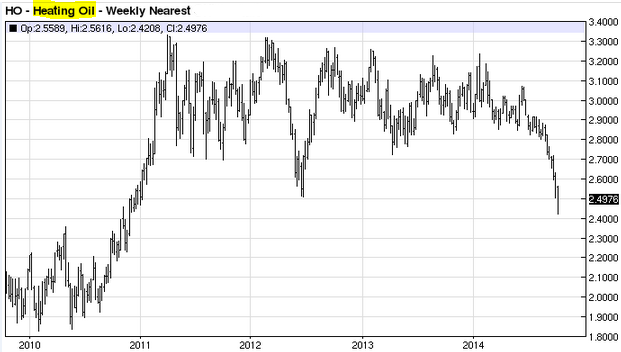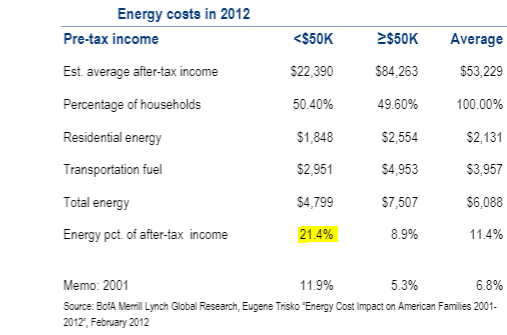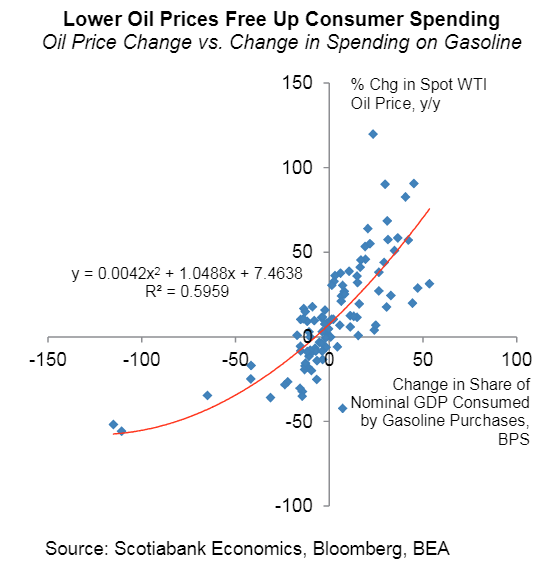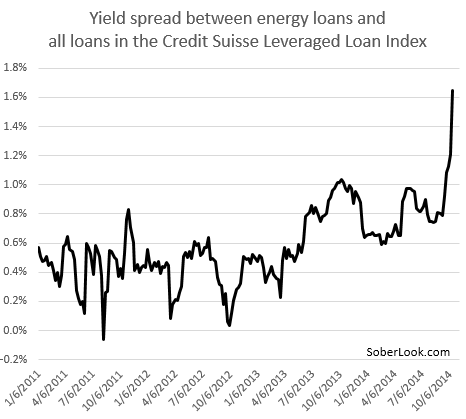Sự suy giảm gầy đây của giá dầu thô có ảnh hưởng tích cực ngay lập tức lên tiêu dùng của Mỹ cũng như một số lĩnh vực khác. Tuy nhiên, điều đó cũng có thể cho thấy sự suy giảm kinh tế. Dưới đây là một số tác động cần xem xét.
1. Tốt:
Tiêu dùng Mỹ không chỉ được hưởng lợi từ sự sụt giảm của xăng dầu mà còn từ cả việc giảm giá của chất đốt.

Source: barchart
Với đồng lương ngày càng khó khăn, những khoản tiết kiệm có thể bị ảnh hưởng, đặc biệt với những gia đình có thu nhập dưới 50 ngàn USD 1 năm.
Theo Merril Lynch: -… những người tiêu dùng sẽ nhanh chóng được hưởng lợi từ tiết kiệm chi phí năng lượng. Nhiều gia đình sống theo dạng “tay làm hàm nhai”, chi tiêu hầu hết thu nhập có sẵn. Khảo sát của Consumer Finances cho thấy 47% gia đình không có bất kỳ tiết kiệm nào trong năm 2013, tăng từ con số 44% của năm 2004. Qua thời gian, chi phí năng lượng ngày càng trở nên lớn trong tổng ngân sách của những gia đình thu nhập thấp. Trong 2012, các gia đình có thu nhập thấp hơn 50 ngàn USD đã chi tiêu trung bình 21.4% thu nhập cho năng lượng. Gấp đôi so với năm 2001, và thập chí gần gấp 3 lần đối với những gia đình có thu nhập trên 50 ngàn USD.

Source: Merrill Lynch
Hơn nữa, với giá xăng dầu giảm, người tiêu dùng sẽ không tăng mua năng lượng hơn họ đã từng trước đó. Lịch sử cho thấy, khi giá dầu giảm, tiêu dùng xăng dầu bằng dollar cũng giảm theo. Tiền tiết kiệm được trong chất đốt sẽ được chuyển hướng sang một nơi nào khác trong nền kinh tế.

Source: Scotiabank
Không những thế, giá dầu sẽ còn áp lực giảm, ít ra là trong ngắn hạn, giữ lạm phá kỳ vọng ở mức thấp hơn. Điều đó có nghĩa lãi suất ngắn hạn cho đến dài hạn thấp hơn và vì thế lãi suất thế chấp mua nhà cũng được điều chính. Chúng ta thậm chí có thể xem xét hoạt động tài trợ mới.
Lợi ích khác bao gồm giá vận chuyển rẻ hơn và cả giá PVC, nylon, polyester… rẻ hơn.
2. Xấu:
Mỹ đã trở thành một nước sản xuất năng lượng chính, với lĩnh vực đã đóng góp đáng kể cho sự tăng trưởng kinh tế và tỷ lệ thất nghiệp thấp những năm gần đây.
Nếu giá dầu tiếp tục thấp, quả boom này sẽ đặt vào tình thế nguy hiểm. Khi đó, hoạt động đầu tư có thể suy giảm và ảnh hưởng ngược lại nền kinh tế Mỹ.
3. Xấu xí:
Một con số đáng quan tâm của những công ty năng lượng tầm trung ở Mỹ, nhiều công ty được tài trợ thông qua vốn đầu tư tư nhân, với một mức đòn bảy cao. Đòn bẩy thị trường tài chính đang trở nên liên thông với tình trạng nợ của cả những công ty lớn hơn. Đây là sự chênh lệch giữa lãi suất vay của lĩnh vực năng lượng so với trung bình tại Credit Suisse.

Source: Credit Suisse
Những lời đồn đại đang lưu hành cho rằng 1 số công ty năng lượng đang sẵn sàng để tái cấu trúc. Cũng có những câu chuyện rằng những quỹ lớn đang chuẩn bị để mua lại nợ xấu của những công ty năng lượng có đòn bẩy lớn. Tuy nhiên, với thanh khoản đang khá dồi dào trên thị trường, đặt cược vào những công ty với tình trạng nguyên hiểm của giá hàng hóa sẽ bị giới hạn về sau, chí ít là cho đến khi thị trường dầu hỏa ổn định trở lại. Việc phá sản, xa thải và hủy dự án trong lĩnh vực năng lượng có thể xảy ra trong thời gian gần. Và điều đó rõ ràng là có ảnh hưởng tiêu cực đến thị trường lao động cũng như nền kinh tế Mỹ nói chung.
Cuối cùng, điều này là tin tức tệ hại cho việc phát triển nhiên liệu thay thế. Với mức giá này, nhiên liệu hóa thạch đang trở nên khó bị cạnh tranh.
Nguồn: finandlife|http://soberlook.com/